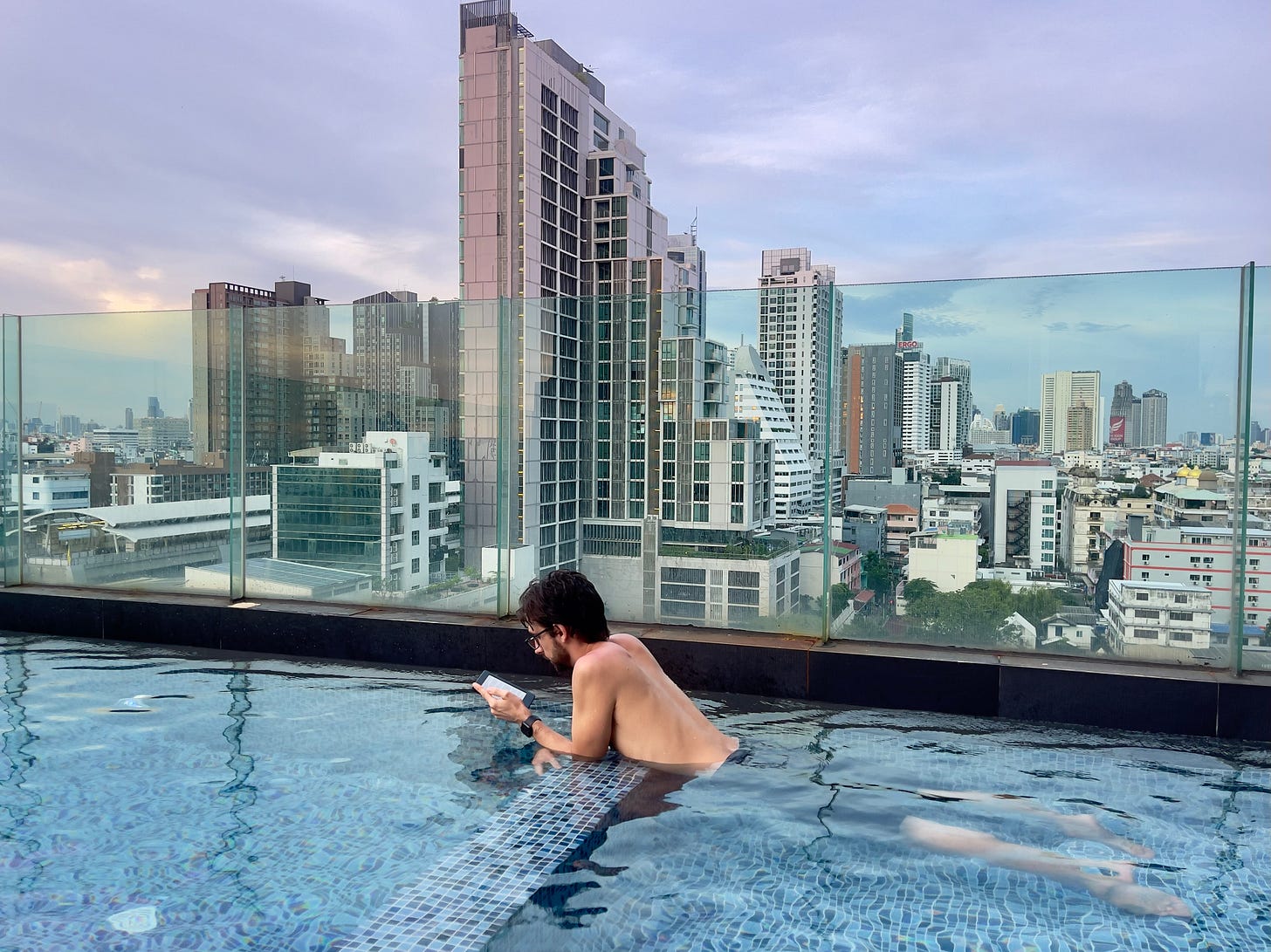I’ve lost count of how many times people have said, ‘Must be nice to always be on vacation!’ Spoiler: We work. A lot. Here’s what people get wrong about digital nomads.
I often get people asking me, “How can I become a digital nomad?”
I might write something in-depth about this at some point (it’s not that easy—there’s no magic path to get there).
But today, I thought I’d start by focusing on what a digital nomad actually is and the misconceptions attached to the label. There are a lot of clichés, often negative ones. Some are true, some couldn’t be further from reality… and, as with most things in life, the truth lies somewhere in the middle.
People love to overcomplicate what it means to be a digital nomad. But at its core, digital nomadism is actually pretty simple—once you strip away the myths.
Let’s dive in.
10 Biggest Clichés and Misconceptions About Digital Nomads
I asked ChatGPT to list the most common clichés and misconceptions about digital nomads. Here’s my take on each one.
1. Digital Nomads Are Always on Vacation
Good start 😡 This one is complete BS.
Most digital nomads work the equivalent of a full-time job, if not more. Some even have actual full-time jobs! Freelancers and entrepreneurs have to hustle just like everyone else… plus, they deal with time zones, unstable WiFi, and balancing work with constant travel.
The biggest reason for this misconception? Social media.
Nomads rarely post pictures of themselves working 8-hour days in a hotel room or taking a 12-hour overnight train while trying to meet deadlines. They only share the highlights:
🏝️ A beach day.
🍹 A sunset cocktail.
✈️ A cool new destination.
That’s what people see, and they assume that’s the whole story.
Another reason? Flexible schedules. I often work late at night or on weekends. That way, I can enjoy quiet, sunny weekday afternoons outside when I want to. This can make it look like I’m always “on vacation,” but I’m really just optimizing my time differently.
This is why I openly share both the pros and cons of this lifestyle.
2. It’s a Low-Cost, Carefree Lifestyle
The real answer? It depends.
Like any lifestyle, it can be whatever you want it to be.
Some nomads (like me) have limited incomes while trying to grow their businesses, so they live in low-cost countries to stretch their money further. Others have high incomes and live a luxurious lifestyle.
I think this cliché comes from the fact that most nomads start out as young freelancers or entrepreneurs with limited money. But as more people embrace digital nomadism—including high earners and families—this perception will change.
And by the way, living in a low-cost country doesn’t mean living poorly! You can get way more for your money in some places compared to the US or Europe.
For example, when Rosie and I go out for sushi in Europe or the US, it typically costs €80-100. In Bangkok? €20 max—and by that point, I can’t even move because I’ve eaten so much 🤣.
3. Anyone Can Do It With a Laptop
No, not everyone can do it. That’s for sure.
It depends on your skills, profession, risk tolerance, and financial situation.
But I will say this: this lifestyle is more accessible than most people think.
At its core, all you need is:
✅ A job that doesn’t require you to be in a specific location.
✅ Enough income to sustain yourself.
That’s it. It’s really that simple.
4. It’s Only for Freelancers or Entrepreneurs
Definitely not.
While the movement started with freelancers and entrepreneurs, remote work has opened the door for employees to join the lifestyle.
More companies than ever are fully remote, with teams spread across different time zones. Even though some companies are pushing return-to-office policies, I believe the global trend will continue toward remote work.
Of course, employees have more constraints than self-employed nomads (like fixed schedules and security considerations), but it’s more possible than ever before.
5. They’re All Young, Single, and Carefree
This was probably true at some point, but it’s changing fast.
I’m 37 and married—not exactly a fresh-out-of-college backpacker.
Recently, I got a message on BlueSky from a dad who said:
“Today is our first day of nomading! Starting with Greece and then we’ll see. Doing it with two kids is different, but still very cool.”
If you have the financial means and a job that allows travel, you can make it work.
The biggest factors? Risk tolerance and willingness to step outside your comfort zone—not age or relationship status.
6. They Live in Hostels and Work From Cafés
Some do, some don’t—there are no rules here.
It depends on age, finances, work setup, and personal preference.
Personally, I rarely stay in hostels. They tend to be noisy and full of young people partying. I would have enjoyed that in my 20s—not so much now. I prefer privacy and quiet.
Some nomads rent luxury Airbnbs. Others prefer co-living spaces. Some work from cafés all the time, while others go to coworking spaces or just work from their accommodation.
Luckily, there are options for everyone.
7. They Don’t Pay Taxes
I wish 😅. But unfortunately, I do.
I pay U.S. taxes because my business is based there. I also pay French taxes since I earn income there.
Taxes are a major headache for digital nomads. Since many of us don’t stay in one country long enough to be official residents, it can get complicated fast.
Most government systems are outdated when it comes to nomads. Until policies catch up, we just have to navigate the system as best we can.
For example, even though I file as a French tax resident, I technically don’t stay in France long enough to qualify. But… there’s no better alternative at the moment.
8. They Have No Stability or Routine
This is an interesting one.
I actually feel very stable. Stability doesn’t have to mean staying in one place forever.
For me, stability comes from within, not from a fixed location.
Now, routines? That can be trickier. It depends on how fast you travel.
When we move every few days or weeks, it’s hard to maintain a routine. But when we stay somewhere for a couple of months, it’s much easier to settle into a rhythm.
That said, after years of doing this, I’ve learned to create a routine anywhere. My typical day looks something like this:
☀️ Mornings: Free time (gym, swimming, exploring, or just relaxing).
💻 Afternoons: Work from 2 PM to 6 PM.
🍽️ Evenings: Unwind, eat dinner, relax.
⌨️ Late Nights: Work again from 8:30 PM to 11 PM.
Of course, this shifts depending on the location, but I’ve found a rhythm that works for me.
9. It’s Just an Escape From “Real Life”
What even is “real life”? 🤔
Society has conditioned us to believe that a stable job, a mortgage, and a fixed location equal “real life.” But that’s just one version of life.
Who decided that my life is any less real because I don’t have a permanent home? Because I move often?
I’d argue that I’m actually more present in my life than most people. I’m not stuck in autopilot, just going through the motions.
In fact, I’d bet that I’m happier than 80% of people living the so-called “real life.”
Real life isn’t about following the traditional script—it’s about creating a life that feels meaningful to you.
10. The Lifestyle Is Always Glamorous
When you look at digital nomads on Instagram (including my wife Rosie 😆), it does seem magical. They’re always posting stunning destinations, tropical beaches, and dreamy work setups.
But remember: social media is a highlight reel.
Most nomads don’t share:
📌 Their basic, unimpressive hotel/Airbnb rooms.
📌 The 8-hour workdays inside a café.
📌 The 12-hour overnight bus rides with no sleep.
The reality? Yes, it’s fun. I get to live in places where people vacation, and that’s awesome. But it’s still life. There are highs and lows—just like anywhere else.
Did You Know?
Before I wrap up, let’s take a step back—where did the whole ‘digital nomad’ concept even come from?
The term “digital nomad” was coined by Tsugio Makimoto and David Manners in their 1997 book Digital Nomad.
However, earlier mentions of the phrase can be found in publications from the early 1990s. Some sources (see Wikipedia here) indicate that the term was already in use in tech and futurist circles discussing how emerging mobile technology would reshape work and lifestyle.
Makimoto and Manners’ book helped shape the modern idea of digital nomadism, predicting the rise of remote work, freelancing, and location-independent lifestyles—all enabled by the internet.
The 1997 book Digital Nomad by Tsugio Makimoto and David Manners used the term to describe how technology allows for a return of societies to a nomadic lifestyle. Makimoto and Manners identified an emerging “digital nomad” lifestyle freed by technology “from the constraints of geography and distance.”
I haven’t read the book, but making predictions like this in 1997—a full decade before the iPhone launched—is pretty impressive. (I don’t think I even had internet at home back in ‘97 😅).
Final Thoughts
I hope this gives you a realistic look at what digital nomadism is and isn’t.
Of course, this is just my perspective. If you ask a 20-year-old backpacker, a high-earning entrepreneur, or a family of four, you’ll get very different answers!
At the end of the day, digital nomadism isn’t a one-size-fits-all lifestyle—it’s whatever you make it. And as the world shifts, the definition will keep evolving, too. The important thing? Finding what actually works for you.
And last thing before I go, I highly recommend this article: A Brief History of Digital Nomads—an excerpt from the book Global Natives.
💬 I’m curious. If you’re a digital nomad (or thinking about becoming one), what’s the biggest assumption people make about your lifestyle?










As a digital nomad, I feel you 😁
Lots of good points, Jeremie.
I've been a digital nomad for a few years, living between two countries, occasionally travelling to others. One of my uni friends lived in several different countries for education, work and other reasons, and because she had remote businesses, she called herself a digital nomad.
There's no one singular definition of digital nomad, because it's a lifestyle, not a profession. Speaking of which, people make me laugh when they ask: How can I become a digital nomad? Well, I never decide to become one. I had two professions that have existed since the dawn of time that were very easy to adapt to the digital world - and I enjoyed moving and travelling.
Furthermore, people can only make cynical remarks regarding what qualifies as "real life" if someone is wasting their life on silly stuff like drugs and partying. You have a job and you travel, that's real life. And indeed, I've heard of middle-aged nomads selling their houses and embracing the lifestyle. Besides, travelling and running a business teach you real life skills 10x faster than staying put.